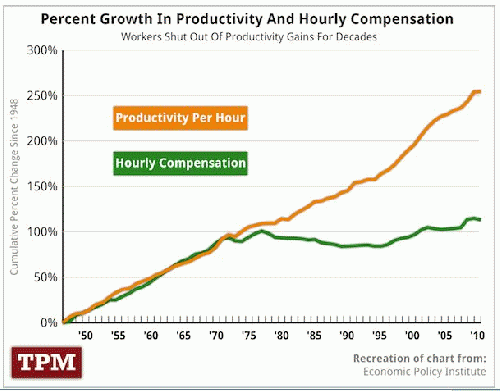Decades of frozen wages relative to our expanding wealth is the root cause of many economic problems. More people falling into poverty, a shrinking middle class, declining retirement savings, increased welfare spending, higher unemployment, more aid to working families, declining government tax revenues, diminished funding for Social Security and Medicare, a sluggish economy (despite a record high stock market), slow job growth, and heightened social tensions along the traditional fault lines of race, ethnicity, and gender are among the many issues influenced by decades of wage stagnation.
Beginning in the late 1970s most American workers received only cost-of-living adjustments in their paychecks while their real earnings gradually diminished each year. Employers increased hourly wages to keep pace with inflation, but they suddenly stopped raising wages to reward workers for their productivity. Earned income has declined for most Americans as a percentage of our gross domestic product (GDP). This amounts to a dramatic and intentional redistribution of new wealth over the last 40 years. Nearly all this new wealth has gone to the rich and powerful.
The visual evidence of wage stagnation relative to hourly GDP is apparent in one powerful graph (below). You may have seen this graph before.
SYMPTOMS
The effects of wage stagnation on our economy have been gradual and cumulative. Its impacts don't raise red flags from one year to the next, but the cumulative effects are obvious. The trending rise in income inequality, for example, was missed entirely for 25 years, and then it still took another decade for it to catch the public's attention.
According to USDA data on the real historical GDP and growth rates[i], the U.S. economy grew by $368 trillion between 1976 and 2013. That is a 109.4% rise in national wealth, more than a doubling of the national economy. Almost none of that wealth was shared with wage earners. If hourly wages continued to grow in proportion to hourly GDP, as it had for decades prior to the mid-70s, the current median family income today would be close to $100,000 a year instead of the current $51,017 per year.[ii]
Think about that for a moment, and about all the implications for wage-based taxes and payroll deductions. For simplicity sake, let's say wages would have double if the workforce received productivity raises. That would significantly reduce the number of families currently eligible for taxpayer subsidies such as SNAP (food stamps), housing assistance, daycare, and the like. At the same time the workforce would be generating much more income-tax revenue.
Consider next the impact wage stagnation has had on payroll deductions. Social Security and Medicare premiums have not financially benefited from the growing economy. Double current wages and you double current revenues for these programs as well. Moreover, the economy has grown at an annual rate of 2.9% since 1976. If Social Security and Medicare had benefited from this new annual wealth, the effect on current revenue projections would be profound. We would not be looking at a projected shortfall any time in the future.
The impact of wage stagnation on consumer spending is perhaps the most insidious problem. While worker wages have stagnated, the production of goods and services has grown. How is that possible? Some of this production is sold in foreign markets, but domestic markets are still primary. And it is here where economic theories have done a disservice.
A generation of economists and business leaders have treated consumers and workers as if they were not one and the same. This has fractured how we look at the economy and given rise to the notion that labor is just another business commodity. It disguises the fact that labor wages fuel consumer spending. Wages help drive the whole economy while wage stagnation reduces consumption over time.
To overcome this effect we have seen the need for mothers to enter the workforce en mass, and for banks to invent credit cards to bolster consumer spending. These and other creative measures can no longer forestall the decline in worker spending. So while the financial markets ride the tide of America's growing wealth, the fortunes of those who have been cut off from that new wealth continue to slip beneath the waves.
As for social tensions among different racial, ethnic, and gender groups, the effect of stagnant wages relative to the nation's growing wealth creates a lifeboat mentality and zero-sum thinking. For the first time in many generations parents are worried that their children will have less in life than they had. When the whole pie is shrinking a bigger slice by one person means a smaller piece for others. This thinking exists because for over 95% of wage earners the economic pie hasn't grown in 40 years.
(Note: You can view every article as one long page if you sign up as an Advocate Member, or higher).






